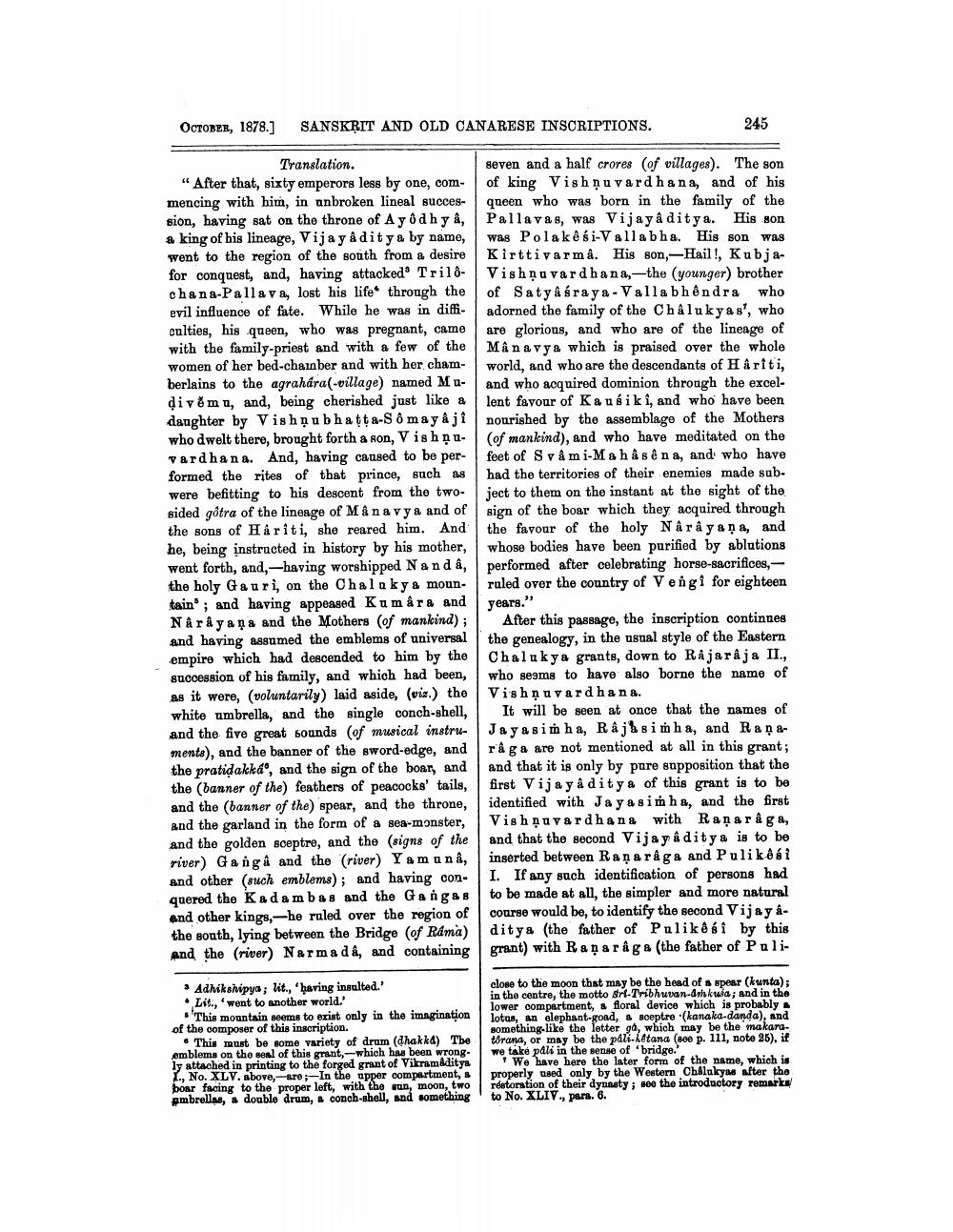________________
OCTOBER, 1878.]
SANSKRIT AND OLD CANARESE INSCRIPTIONS.
245
Translation.
seven and a half crores (of villages). The son “After that, sixty emperors less by one, com- of king Vishnuvardhana, and of his mencing with him, in unbroken lineal succes- queen who was born in the family of the sion, having sat on the throne of Ayodhyâ, Pallavas, was Vijay aditya. His son a king of his lineage, Vijayadity a by name, was Polaké si-Vallabha. His son was went to the region of the south from a desire Kirttivarma. His son, -Hail!, Kubjafor conquest, and, having attacked Trilô- Vishnuvardhana,-the younger) brother chana-Pallav Ay lost his life through the of Satyasraya - Vallabhêndra who evil influence of fate. While he was in diffi- adorned the family of the Châluk yas', who culties, his queen, who was pregnant, came are glorious, and who are of the lineage of with the family-priest and with a few of the Mâna vya which is praised over the whole women of her bed-chainber and with her cham- world, and who are the descendants of Hariti, berlains to the agrahára(-village) named Mu- and who acquired dominion through the exceldivému, and, being cherished just like a lent favour of Kausiki, and who have been daughter by Vishnu bhatta-Somayajinourished by the assemblage of the Mothers who dwelt there, brought forth a non, Vishnu- (of mankind), and who have meditated on the vardhana. And, having caused to be per- feet of Srâmi-Ma h â sê na, and who have formed the rites of that prince, such as had the territories of their enemies made subwere befitting to his descent from the two- ject to them on the instant at the sight of the sided gôtra of the lineage of Manavya and of sign of the boar which they acquired through the sons of Hariti, she reared him. And the favour of the holy Narayana, and he, being instructed in history by his mother, whose bodies have been purified by ablutions went forth, and, -having worshipped Nanda, performed after celebrating horse-sacrifices, the holy Gauri, on the Chala kya moun- ruled over the country of Vengi for eighteen tain; and having appeased Kumara and
years." Narayana and the Mothers (of mankind); After this passage, the inscription continnes and having assumed the emblems of universal the genealogy, in the usual style of the Eastern empire which had descended to him by the Chalukya grants, down to Rajaraja II., Succession of his family, and which had been, who seems to have also borne the name of as it were, (voluntarily) laid aside, (viz.) the Vis hņuvardhana. white umbrella, and the single conch-shell, It will be seen at once that the names of and the five great sounds of musical instru- Jayasiṁ ha, Rajasimha, and Raņaments), and the banner of the sword-edge, and råga are not mentioned at all in this grant; the pratiļakká, and the sign of the boar, and and that it is only by pure supposition that the the (banner of the feathers of peacocks' tails, first Vijay aditya of this grant is to be and the (banner of the) spear, and the throne, identified with Jayasinha, and the first and the garland in the form of a sea-monster, Vishņu vardhana with Ranarâ ga, and the golden soeptre, and the signs of the and that the second Vijayaditya is to be river) Ganga and the (river) Yamuna, inserted between Ranaråga and Pulike si and other such emblems); and having con- I. If any such identification of persons had quered the Kadambas and the Gangas to be made at all, the simpler and more natural and other kings-he ruled over the region of course would be, to identify the second Vijayathe south, lying between the Bridge (of Rama) ditya (the father of Pulikasi by this and the (river) Narmada, and containing grant) with Ranaråga (the father of Puli
• Adhikshipya; lit.,'having insulted.' • Lit., 'went to another world.'
This mountain seems to exist only in the imagination of the composer of this inscription.
• This must be some variety of drum (dhakkd) The emblems on the seal of this grunt, which has been wrong. ly attached in printing to the forged grant of Vikramaditya L., No. XLV. above, -60;- In the upper compartment, boar facing to the proper left, with the run, moon, two pmbrellas, double drum, conch-shell, and something
close to the moon that may be the head of a spear (kunta); in the centre, the motto erf-Tribhuwan dah kuala; and in the lower compartment, a floral device which is probably . lotos, an elephant-goad, soeptre (kanaka.danda), and something like the letter ga, which may be the makaratörana, or may be the páli.hetana (see p. 111, note 25), if we take pals in the sense of 'bridge.
* We have here the later form of the name, which is properly used only by the Western Chaluky after the restoration of their dynasty; see the introductory remarks to No. XLIV., para. 6.




